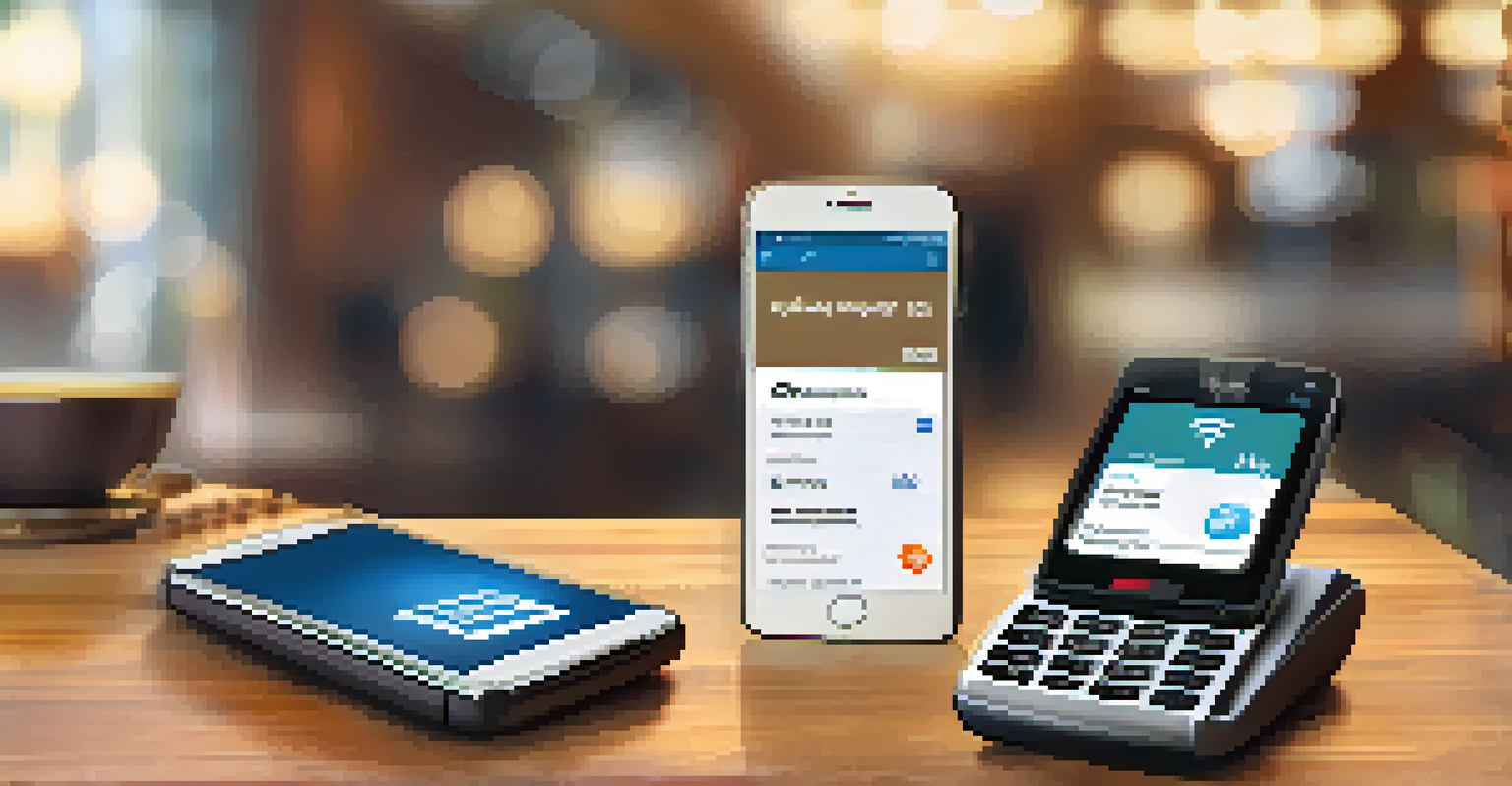The Role of Smart Contracts in Mobile Payment Solutions

Understanding Smart Contracts and Their Basics
Smart contracts are self-executing contracts with the terms of the agreement directly written into code. They operate on blockchain technology, ensuring transparency and security. Imagine them as digital vending machines: once you input your choice and payment, the machine automatically dispenses your snack without needing a middleman to facilitate the transaction.
Smart contracts allow us to exchange value without the need for a trusted third party.
This automation reduces the chances of fraud and human error, making financial interactions smoother. In the world of mobile payments, smart contracts can streamline transactions by ensuring that all parties fulfill their obligations before any funds are exchanged. This reliability is crucial in building trust among users.
Moreover, smart contracts can be programmed to execute under specific conditions, allowing for customized agreements. For instance, a smart contract could automatically release funds to a service provider once a project milestone is achieved. This feature enhances accountability, encouraging users to engage more with mobile payment solutions.
The Rise of Mobile Payment Solutions
Mobile payment solutions have seen a meteoric rise in recent years, driven by the need for convenience and speed in transactions. With smartphones becoming ubiquitous, people prefer the simplicity of tapping their phones to make payments instead of carrying cash or cards. This shift has transformed how we think about money, making transactions seamless and instantaneous.

As more consumers adopt mobile payment methods, businesses are compelled to adapt to meet these changing preferences. The integration of smart contracts into these solutions is a natural evolution, as it enhances the overall user experience. Imagine being able to transact without worrying about the security of your payment; that's what smart contracts aim to provide.
Smart Contracts: Secure Transactions
Smart contracts enhance security in mobile payments by automating processes on decentralized blockchain networks, reducing the risk of fraud and data breaches.
Additionally, the global pandemic accelerated the shift towards contactless payments, further entrenching mobile payment solutions in everyday life. With this surge in usage, the role of smart contracts becomes even more vital in ensuring secure, automated transactions that can accommodate the growing volume of mobile payments.
How Smart Contracts Enhance Security in Payments
One of the most significant advantages of smart contracts is their ability to enhance security in payment transactions. Since they operate on decentralized blockchain networks, the information is encrypted and immutable, making it nearly impossible for any unauthorized alterations. Think of it like a safe deposit box that only you can access, ensuring that your valuables remain secure.
The future of money is digital currency, and smart contracts will play a pivotal role in that evolution.
This level of security is particularly crucial in mobile payments, where users are often concerned about fraud and data breaches. Smart contracts can help alleviate these fears by providing a transparent and verifiable method of conducting transactions. When users know their payment details are protected, they are more likely to embrace mobile payment solutions.
Moreover, smart contracts can incorporate identity verification processes, adding another layer of security. By ensuring that both parties in a transaction have verified identities, the likelihood of fraudulent activities decreases significantly. This added assurance can boost consumer confidence, encouraging more people to utilize mobile payment systems.
Streamlining Transactions with Smart Contracts
Smart contracts can significantly streamline transactions in mobile payment solutions. By automating the verification and execution processes, they eliminate the need for third-party intermediaries, reducing delays and costs. Picture a traditional payment process where multiple parties need to confirm each step; now, with smart contracts, everything is handled automatically, saving time and effort.
This efficiency is particularly beneficial in high-volume environments, such as retail and e-commerce. Businesses can process payments faster, leading to improved cash flow and customer satisfaction. Customers appreciate quick transactions, and businesses can enhance their operational efficiency simultaneously.
Efficiency and Cost Savings
By eliminating intermediaries, smart contracts streamline transactions and significantly reduce costs for businesses, allowing them to reinvest savings into growth.
Additionally, smart contracts can facilitate micropayments, which are small transactions that traditional payment systems often struggle with. For example, content creators can receive payments for each view or download without incurring hefty transaction fees. This opens new avenues for monetization in various industries, making mobile payment solutions more appealing.
Cost Reduction through Smart Contracts
Implementing smart contracts in mobile payment solutions can lead to significant cost savings for businesses. By removing intermediaries, companies can reduce transaction fees typically associated with payment processing. Think of it as cutting out the middleman in a deal, allowing you to keep more of your earnings.
These cost reductions can be especially impactful for small businesses and startups, which often operate on tight budgets. By lowering overhead costs, they can reinvest those savings into other areas of their operations, such as marketing or product development. This financial flexibility can be a game changer for many entrepreneurs.
Moreover, the efficiency provided by smart contracts can lead to reduced administrative costs as well. With less time spent on manual processes and fewer errors to rectify, businesses can allocate their resources more effectively. This optimization not only boosts profitability but also enhances overall operational efficiency.
Real-World Applications of Smart Contracts in Payments
Smart contracts are already making waves in various industries, showcasing their potential in mobile payment solutions. For instance, companies like VeChain are using smart contracts to streamline supply chain payments, ensuring that funds are released only when goods are delivered as promised. This real-world application highlights how these contracts can enhance accountability and transparency.
In the gig economy, platforms like Upwork are exploring smart contracts to automate payment processes between freelancers and clients. By ensuring that payments are executed only upon completion of work, both parties can feel secure in their transactions. This fosters a sense of trust that is essential in freelance work.
Real-World Applications Emerging
Smart contracts are being utilized in various industries, including supply chain and freelancing, to ensure transparency and accountability in payment processes.
Moreover, smart contracts can facilitate international transactions by automating the conversion of currencies and ensuring compliance with regulations. This capability can significantly reduce the time and effort involved in cross-border payments, making it easier for businesses to engage in global commerce. As these applications grow, we can expect to see even more innovative uses for smart contracts in mobile payment solutions.
Future Trends for Smart Contracts in Mobile Payments
As technology continues to evolve, the future of smart contracts in mobile payment solutions looks promising. We can expect greater integration with emerging technologies like artificial intelligence and machine learning, which can enhance the capabilities of smart contracts further. Imagine a payment system that learns from user behavior and adapts to provide a more personalized experience; that’s the potential we’re heading toward.
Furthermore, as regulatory frameworks around cryptocurrencies and blockchain technology become more defined, we will likely see increased adoption of smart contracts in mobile payments. This regulatory clarity can provide the confidence needed for businesses to invest in and implement these solutions. The more businesses embrace this technology, the more innovation we’ll see in the mobile payment landscape.

Lastly, advancements in mobile technology, such as 5G and improved encryption methods, will enhance the effectiveness of smart contracts. With faster connectivity and better security, the possibilities for mobile payments powered by smart contracts are virtually limitless. As we look ahead, the synergy between these technologies promises to revolutionize how we think about and conduct transactions.